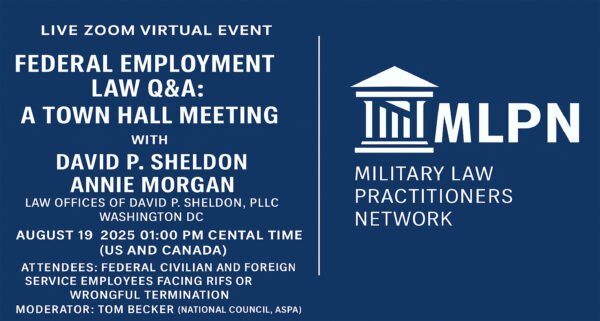
Attorney Dylan Thayer and The Law Offices of David P. Sheldon, PLLC will argue before the U.S. Court of Appeals for the D.C. Circuit on Thursday, September 4, 2025, at 9:30 a.m. (ET) in Courtroom 31 the case of Andrew Dudt v. Daniel Driscoll (No. 24-5084).
Attorney Dylan Thayer will present oral argument on behalf of the Army Major, a service member challenging the military’s handling of adverse actions that, he asserts, were imposed without fair process. The appeal raises critical questions about whether military authorities followed proper procedures, applied regulations consistently, and respected the constitutional and statutory rights of those serving in uniform.
This case centers on due process protections for service members, including whether decisions affecting careers and reputations must meet the same standards of fairness that apply in civilian federal employment. The Major contends that military officials relied on procedurally flawed processes and inconsistent regulatory interpretations that denied him a fair opportunity to defend himself.
At stake is not only the future of one service member but also the precedent the Court may set for thousands of others who face similar disciplinary or administrative actions. A ruling from the D.C. Circuit could reaffirm that military regulations must be enforced with integrity, consistency, and respect for constitutional rights.
“This hearing underscores the principle that service members deserve the same fundamental fairness that they sacrifice to protect for others,” said Dylan Thayer, plaintiff’s attorney. “We are asking the Court to ensure that military authorities are held accountable to the rule of law and that no one’s career is jeopardized by arbitrary or inconsistent decisions.”
Oral argument before the D.C. Circuit is a critical stage in the appellate process, where judges directly question counsel to test the strength of legal theories and evaluate how the case fits into established precedent. This hearing provides the Court an opportunity to clarify how far military authorities can go when interpreting regulations, and whether service members are entitled to the same safeguards of fairness expected in all other federal contexts.
The outcome could influence how future adverse actions are reviewed, providing guidance not only to military commands but also to boards of correction, administrative review bodies, and federal courts tasked with evaluating service member rights.
Event Details
- Case: Andrew Dudt v. Daniel Driscoll (No. 24-5084)
- Court: U.S. Court of Appeals for the D.C. Circuit
- Date/Time: Thursday, September 4, 2025, at 9:30 AM (ET)
- Location: Courtroom 31
About the Law Offices of David P. Sheldon, PLLC
The Law Offices of David P. Sheldon, PLLC, based in Washington, D.C., represents service members, veterans, and federal employees in high-stakes legal disputes. With a record of litigating precedent-setting cases before military courts, federal agencies, and appellate courts, the firm is committed to ensuring fairness, due process, and justice for those who serve.
Disclaimer
This press release is for informational purposes only and does not constitute legal advice.








